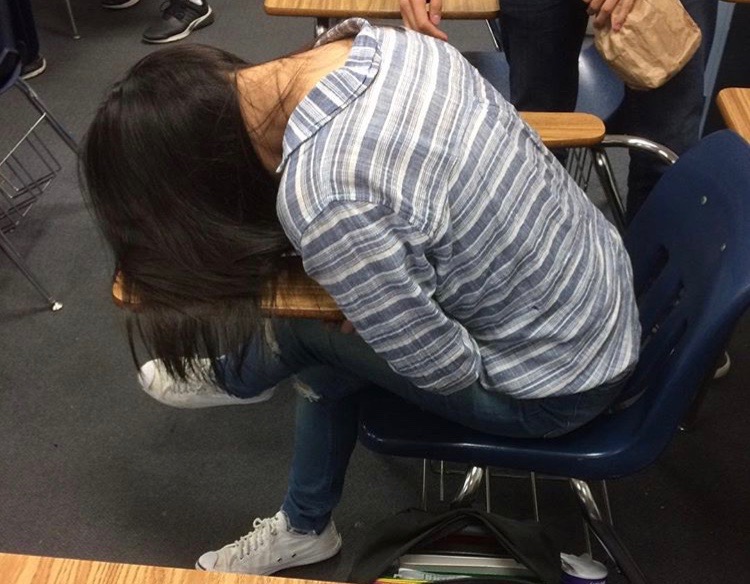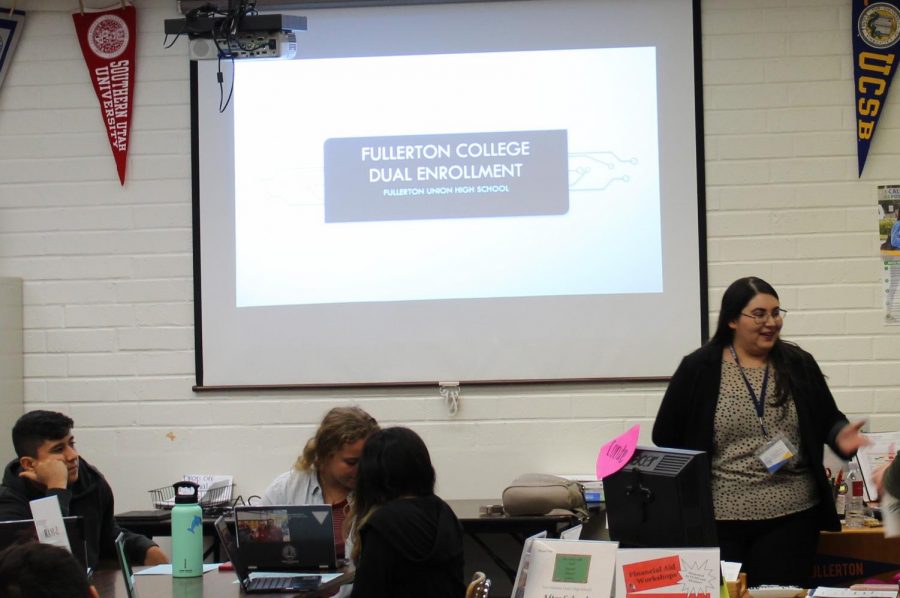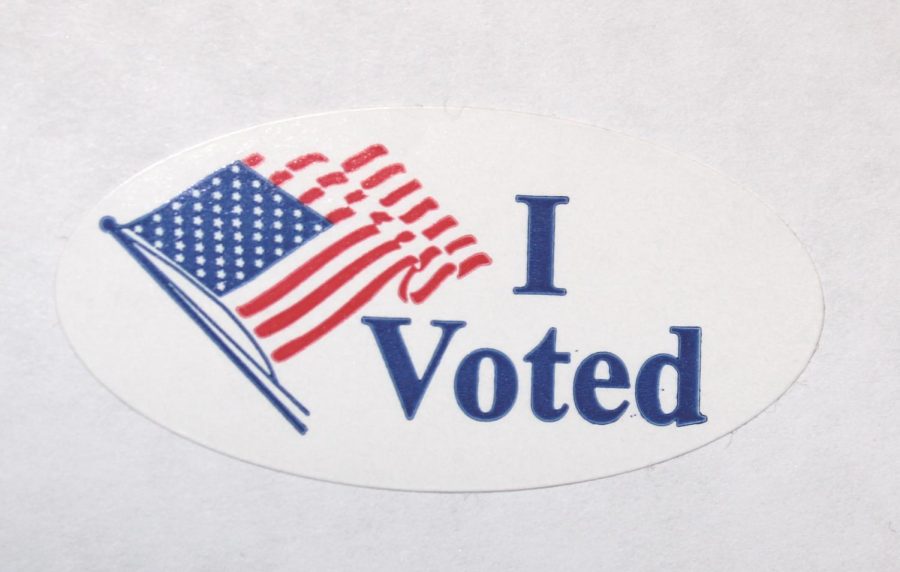When it comes to high school course work, things can tend to pile up, and with most teenagers having a proclivity for procrastination, simply finishing a single night’s homework can become a stressful and rough workload. Add in after school activities like sports, extracurriculars, and jobs, a night in the life of a high schooler becomes a troubling scene.
Plus, it’s always important to maintain a healthy lifestyle, which means getting eight to ten hours of sleep each night, and taking time to relax. Count up the hours, there are definitely not enough in a day to get everything done.
Senior Sam Cafferty is a full IB student and works at IN-N-OUT which makes his schedule pretty jam-packed.
“I work at an In-N-Out, so on days when I’m working, I get out of school, go home and take a nap and then go to work,” Cafferty said. “It’s not that I don’t have time to do all of my homework, it’s that I’ll be so tired I don’t have energy to do it. It’s all just time consuming, so to have more time would help.”
It’s safe to say that the typical high school student experiences stress on, at the very least, a weekly basis, and depleted energy reserves plays a major role in contributing to that stress.
According to a recent study by the Journal of Adolescent Health, only a mere eight percent of high school students get a recommended good night’s sleep–eight to ten hours–on an average school night. The other 92 percent are living with borderline-to-serious sleep deficiencies that lead to headaches, depression, and poor performance in school.
Sleep plays a major role in Cafferty’s schedule, as he typically feels tired throughout the day. “When I get home from school I sleep, just sleep,” Cafferty said. “I probably get about five hours [of sleep] each night. It would be amazing to have more time to sleep.”
Although he admits that procrastination does contribute to his sleep shortage, he also explains that his job tends to make him too tired to feel motivated.
“I’m sure if actually just sat down and did all of my stuff without any distraction, I could get about eight hours of sleep,” Cafferty said. “I am guilty of procrastinating; I try to be good about it, but it’s hard. It’s worse when I work, and I’m tired. I work for four hours on weekdays, usually from five to nine, so by 9 o’clock I’m already tired when I get home.”
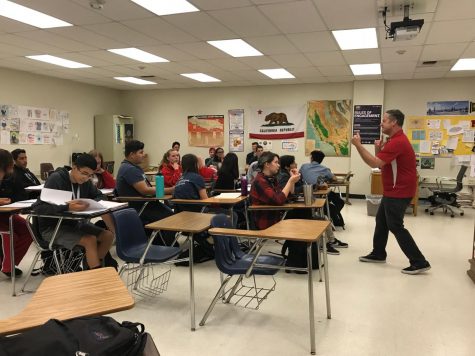
Not only seniors suffer from sleep deprivation, as freshman Samantha Dennis’s dream is to also have more time to sleep.
“When I get home I wish I could just go to sleep, because I’m always really tired,” Dennis said. “…Usually on the weekends I get a chance to relax more, but I mean I get to sit down when I do homework, so does that count as resting? It takes brain power though, so probably not.”
For senior Janet Kim, living a healthy lifestyle is difficult as she struggles to balance her yearbook duties, dance obligations, and typical homework assignments.
“Nowadays, if I go to sleep at midnight, I’ll actually be really thankful,” Kim said. “I’ll sleep at two or three a.m. on normal homework and quiz days, but sometimes when I have tests, homework, and quizzes all on the next day, I’ll sleep a little past three a.m. And oh my god, because I’ll always be looking at the screen, or studying, my eyes have been so dry and hurt so much. It feels as if sand is stuck in my eyes and no matter how many times I’ll put in eye drops the pain never goes away. I think that a lack of sleep really deters one’s health just because our body has a limited amount of time to really rest.”
Cafferty also struggles with maintaining a balance when scheduling his nights, and often finds himself making critical sacrifices. “I usually make time to either rest or get things done, I sacrifice things–like getting homework done–so that I can do stuff that I actually want to do,” Cafferty said.
Freshman Karina Hunt leads a similar lifestyle as she attempts to get her work done in between theater rehearsals.
“We’ll get some time to work, during the rehearsal process–although not so much during tech week,” Hunt said. “But I’m a morning person so if I don’t get my homework done the night before I’ll get up early–even earlier than normal because I have a zero period–and finish it then.”
However, Hunt admits that she’s great with time management, so she never really finds herself at wits end when it comes to completing her assignments.
“When I come home from school I do wish I could watch some T.V. or maybe listen to some music, but I do actually like to work so I like doing my homework right away,” Hunt said. “I like doing my homework right away because I like doing work. I don’t like to sit around and be lazy.”
It is commonly recommended that students start their homework immediately upon coming home after school, not only because it allows them to get things done early, but because the content is fresh in their minds.
According to research done by Dr. Harris Cooper, who is a professor of psychology at Duke University, the best time, and the most productive time, to get work done is as soon as one gets home from school.
However, this can be a difficult task to accomplish, as students tend to be too tired to work.
In a survey conducted on the Tribe Tribune news site, 22 percent of those who voted claimed to use technology as soon as school lets out. And with only twelve percent claiming to start their homework it seems clear that students are unmotivated when it comes to school work outside of school.
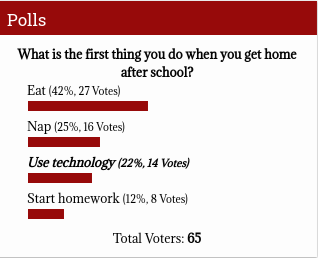
Kim is a perfect example of that twenty-two percent, as she often finds herself resting for too long after school, and ends up eating into her sleep time trying to get her work done.
“I wish I could immediately jump into homework without having to rest for such a long time,” Kim said. “If I didn’t eat, rest, and shower, I’d probably be able to accomplish so many things in one day, but, unfortunately, I’m not a working-machine–I can’t resist doing activities that I purely enjoy, and when I don’t feel so forced to do something. As I said before, right when I get home, I’ll surf the internet for a good 20 minutes, eat two meals (a second lunch and a dinner) and take a shower. I just somehow can’t automatically get to homework because it takes my body and brain a while to tell me ‘alright Janet, you have work to do now.’”
Despite their work loads and their constant desires to sleep, those interviewed said they enjoyed homework and didn’t really feel like the work load was too much. But that it was their own exhaustion that got in the way of their productivity.
Cafferty actually feels recognized by teachers as they dole out sensible expectations.
“I don’t think teachers assign too much work, and I think that they give reasonable deadlines; I do think they generally consider our work load,” Cafferty said. “I have had times though, where they give too much busy work that don’t really benefit me.”
Kim feels the same way about the necessity of homework, but differs on the reasonability of the amount given. “I do believe that if we are required to study on a subject anyways, then the amount of homework should be adjusted according to the performance of students,” Kim said. “Of course, if we are struggling on a certain subject then homework is very helpful. But if all students seem to understand a particular lesson I believe the amount of homework given should be adjusted just because we have other activities to accomplish.”
So, while homework does play a key role in limiting student sleep, when it comes down to it, it seems like students just need to pay attention to their schedules and manage their time as best they can. However, it is recommended that if the time reaches past midnight, they put down the pencil, plug in the Chromebook, and get some sleep.

